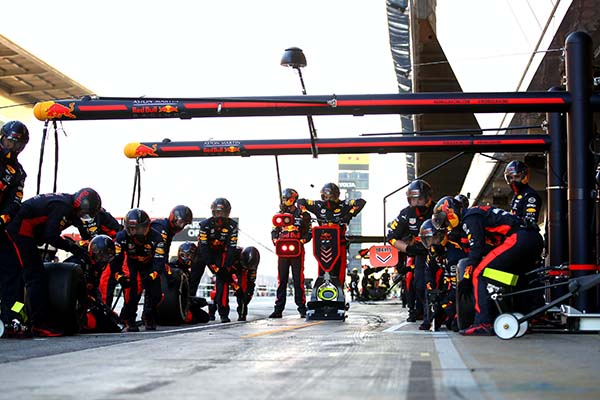Everyone thought the Australian Grand Prix was going to happen. It didn’t. Then, everything changed.
Formula 1 fans were poised to watch the first race of the 2020 season in March, but the coronavirus pandemic arrived.
The weekend of the race in Melbourne was truly F1. There was drama, disagreements, chaos and uncertainty, conflicting information, confidential leaks, and backroom deals. In the end, everyone was disappointed.
Fans hoped the season would still prevail, but as time went on and race after race was postponed or canceled, reality set in. there was a good chance there would be no 2020 season.
This year was to see the return of the Dutch Grand Prix as well as a new track in Vietnam. Europe took the pandemic serious and flattened their curve. We now have eight races confirmed to start the season. They will all be in Europe and behind closed doors, but fans will still be able to watch the broadcasts.
The first race is in Austria on July 5. It’s also my 50th birthday. Plans are in the works for an 18-race season. I am happy for the races to begin for purely selfish reasons.
Formula 1 is a respite from my mental illness. It’s a time to calm the whirlwind in my mind and focus on the fastest cars in any sport with the best drivers in the world.
My brain doesn’t have time to think about the the triggers which cause my flashbacks. From the first practice on Friday to the race on Sunday, my brain churns with thoughts of on-track battles, wheel-to-wheel racing, team strategies, pitstops, overtaking, penalties, and the mind games that come with race weekends.
When I watch a lap with a driver, I get a sense of the thrill of the track. I can hear the down shifts, see the quick maneuvering, and watch hot laps in qualifying where drivers hope to place their car on pole.
The chaos of a Formula 1 weekend is a little bit like the chaos in my mind. There’s always something new to calculate. A driver thought they qualified third, but that’s been taken away by a tenth of a second. Now they must recalculate what they need to do to get another lap in and hopefully take that place back.
Pit stop strategies during the race involve not only managing your tires until the lap you’re scheduled to come in, but teams must also calculate where you are going to return on the track. Will it be clear? Will there be a pack of backmarkers they must try to beat as they stay within the speed limit of the pit lane?
If a driver is fighting for first, additional calculations must be made to make sure they return to the track in the ultimate position to win.
Watching at home allows me to be continually informed of all the drivers’ positions on the track, who has made pit stops and at what lap, and I can listen to timely commentary from Will Buxton.
With all this going on, there’s no time for my brain to think about childhood trauma or depression. It can’t shove forth any intrusive thoughts because my mind is constantly shifting in at least five directions during the race. It may sound frenzied to some, but it’s a peaceful moment for me, especially during qualifying and the race.
Formula 1 is also the pinnacle of motorsport. The technology in the sport is on the bleeding edge of what seems capable. The drivers will put their skills on display. It is a show of hyped-up personalities, rivalries, teamwork, and drama all along the pitlane.
There will spectacular overtaking. Dominant performances and crushing defeats will be there for all to see. Crashes are inevitable and while we can all appreciate the safety measures of F1, with each crash comes the moment where you wait with bated breath to hear the driver over the radio say, “I’m okay.”
Several drivers made a video explaining what it’s like for them on race day. It’s just the thing for fans to watch with one week until the start of 2020.
I became a fan in 1999 after a friend invited me over watch a race. During that first race, I picked Giancarlo Fisichella as the guy I wanted to follow.
Today, my choice is Romain Grosjean. Yes, I understand the crash-prone comments and the sometimes unjustified remarks about his skills, but Grosjean has been open about his mental health struggles.
“I’ve been seeing a psychologist since September 2012 and Spa-Francorchamps. It has helped me a lot to become a better driver, a better father and a better man.
“We use engineers to set-up the car and we use coaches to improve our physical performance. Why wouldn’t you use a psychologist to improve your brain and the way it works? That’s why I did it.”
As one of the directors of the Grand Prix Drivers’ Association, Grosjean is adept at the political game, too. I expect he will be around F1 long after he stops driving.
If you’re looking for me on a race weekend, I’ll be watching the race. This year, some of the spectacle will be gone due to safety and health precautions as the coronavirus has not been entirely eradicated. That’s okay. I’ll still be glued to my computer screen.
Sunday at 7:10 a.m., can’t come soon enough. The silence and anticipation before lights out is a moment I’m looking forward to experiencing once again as I immerse myself in the world of Formula 1. It’ll be lights out and away we go.


1 Pingback